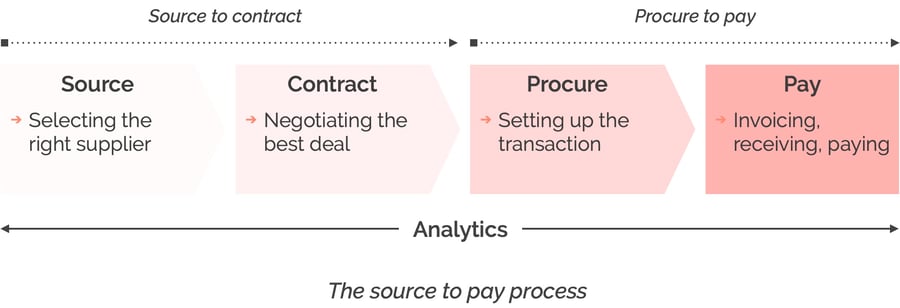Procurement was long perceived as lagging other corporate functions in the digitization race. As recently as 2017, the CEB Digital Procurement Survey found that 55% of procurement organizations had no plans to adopt common digital technologies.
That is finally changing: procurement leaders have recently woken up to the potential of digital, with the Covid crisis of 2020 acting as a powerful catalyst.
But what does digital mean in the context of Procurement? Hopefully more than just replicating old processes with new software...
Digital procurement is the application of disruptive technologies that enable Strategic Sourcing to become predictive, Transactional Procurement to become automated, and Supplier Risk Management to become proactive." - Deloitte
Our goal here is to provide an overview (with examples and linked resources) of digital opportunities at every stage of the source to pay process, with a focus on AI applications.
For general discussions of Procurement's digital transformation, we have found the following resources valuable:
There is a lively group of startups addressing digital procurement challenges. Kearney, Procurement Foundry and Fairmarkit have developed a useful Procurement Tech Innovation Map, sorting these startups by category.

Search, including search based on unstructured data, is one of the main branches of artificial intelligence. At the sourcing stage of the procurement process, search is very useful to identify, rank and select potential suppliers.
Supplier risk management is a super traditional task for Procurement, supported by billion-dollar specialized information providers that have been around for decades. But in today's volatile markets, can static credit scores truely comfort buyers? Using AI (search in particular) to build fuller, dynamic risk profiles makes sense.
Robotic Process Automation (RPA) is "a form of business process automation technology that uses software robots to automate tasks performed by humans" (IBM). It is good at handling standard tasks and/or processes that don't required hands on management by human experts. A lot of RFPs and RFQs fall in that category.
Raw material and energy buyers face three challenges nowadays: they must process loads of internal and external data, accommodate increased market volatility, and take diverse and potentially conflicting (e.g. cost vs. sustainability) company objectives into account. That's a lot of analysis and optimization, for which AI is particularly appropriate.
Natural Language Processing (NLP) is a significant branch of machine learning - used by popular online translators for example. NLP can help buyers maintain a clean contract archive and search it for relevant supplier, product or service information.
With a mix of NLP and RPA, it is now possible to fill out supplier agreements, based on a search of similar contracts and of the emails and documents shared with suppliers during the sourcing process.
AI usage has exploded in the legal industry during the past five years. It turns out that algorithms are good at searching legal databases, identifying language discrepancies, and even summarizing legal arguments... All of this is highly relevant in the context of procurement.
How do you (fairly) price something that doesn't exist yet? This is a key question for buyers working with suppliers on the co-development of new components. Based on a description of these components, AI can search internal and external sources for reference points, and suggest potential pricing formulas.
Repetitive orders of standard items represent a massive share of indirect and direct spend. Buyers will benefit from a combination of machine learning models predicting when to buy and RPA managing the entire procure to pay process.
Similar in principle to automated replenishment, but more complex in practice: some standardized goods and services have real market prices - why not automate the bidding process with AI? The value proposition is enticing: lots of time savings and lower prices.
Recommendations are a classic AI application: we have all experienced Netflix or Amazon suggestions, based on individual and group usage patterns. The idea here is that lots of items are purchased not as standalone products or services, but as parts of larger bundles. Why not automate the bundling?
Invoice processing is an ideal application for RPA: mostly mechanistic, based on standard rules and structured information...
Spend analytics is a popular application of AI for procurement. There is a lot algorithms can do there: automatically classify contracts and invoices in the right categories, find correlations, anticipate trends... Based on such internal analyses, AI can even search external data (structured and unstructured) for benchmarking information.
"Process mining (...) uses event log data to generate process models which can be used to discover, compare or enhance a given process" (IBM). The idea here is to consider the source to pay process as a sequence of events (hopefully logged in a single system like the company's ERP software), and search the corresponding data for optimization opportunities.
Compliance rests on standards, procedures and timely reactions to potential alerts. It is not intrinsically complex, but very time consuming. AI can detect compliance issues, trigger the corresponding alerts, and even automate first responses.
Datapred SA
EPFL Innovation Park
Lausanne 1015
Switzerland
contact@datapred.com